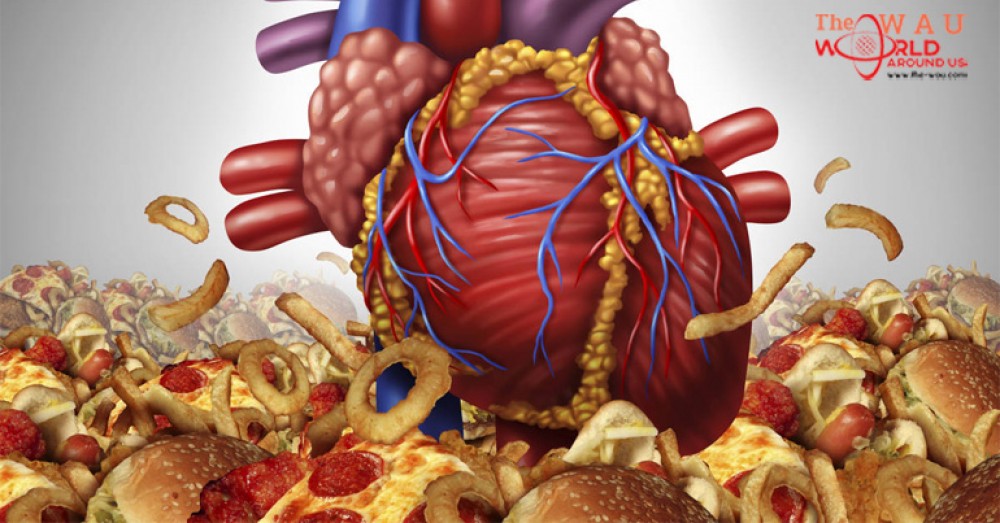Heart attacks occur when the arteries in the body supplying blood become clogged.
Unhealthy lifestyle habits such as smoking and lack of exercise increase your chances for a heart attack.
In addition, a diet high in calories, sodium, and trans fat is a sure way to make your heart unhappy.
Check out the following list of foods that the heart absolutely hates and try to do the best that you can to avoid them.
1. Restaurant Appetizers
Most restaurant appetizers are generally horrible for the heart. Consider all of the salt—and with its sodium—on an order of fries. With one serving, you might be meeting your entire daily requirement for sodium.Not only does sodium increase your chances of a heart attack, your arteries absolutely hate it. What’s worse is that scientists are currently investigating the possibility that salted food is actually addictive.
A recent study tested the “Salted Food Addiction Hypothesis,” or the idea that salt might trigger the pleasure centers of the brain like an addictive drug.
The researchers found that, “Salted food stimulate appetite, increases calorie consumption, augments the incidence of overeating, overweight, obesity and related illnesses.”
2. “Healthy” Choices at a Restaurant
Many people looking to eat healthy opt for a salad when they go out.
The problem is that salads are often loaded with fried of grilled meat. A grilled steak Caesar salad at the popular food chain Applebee’s contains 2,200 mg of sodium!
One of the problems that researchers recognized in a 2006 study is that people don’t always know the nutrition information of restaurant meal options.
According to the study, “most consumers are unaware of the high levels of calories, fat, saturated fat, and sodium found in many menu items.”
Researchers understand that you might order a salad expecting it to be “healthy” only to find that it is loaded with sodium and calories. Fortunately, many restaurants now offer nutritional information on their menu items.
3. Chinese Takeout
Chinese food is typically high in sodium, MSG and unhealthy fats. Ever noticed how greasy some these can be?
One of the big problems with Chinese takeout are the levels of preservatives and monosodium glutamate (MSG) that you might find in many dishes.
Researchers argue that MSG can cause a variety of negative reactions including throat discomfort, itching, and inflammation.
Recently, scientists discovered that some people are allergic to MSG and they don’t even know it. Before they understood the source, the symptoms of the MSG allergy were simply called “The Chinese Restaurant Syndrome.”
4. KFC Original Recipe Chicken
Your heart hates any type of fried food, not to mention that the sodium and fat content of Kentucky Fried Chicken is through the roof!
One of the problems with KFC is that you don’t know exactly where the chicken came from, how it was prepared, or what went into it.
Another issue with KFC and its food is the dangerous levels of dioxin elements that researchers found in the chicken.
It’s not just a problem at KFC, it’s a problem present in all fast food restaurants. KFC, however, had some of the highest levels of toxic compounds.
5. Frozen & Packaged Meals
Frozen meals might only be slightly better than fast food.
You face the same problems that you see with restaurant foods—it’s hard to tell what is in the food and how it was prepared.
The nutritional quality of most frozen meals is appalling.
Most processed foods are laden with sweeteners, salts, artificial flavors, factory-created fats, colorings, chemicals that alter texture, and preservatives.
But the trouble is not just what’s been added, but what’s been taken away.
Processed foods are often stripped of nutrients designed by nature to protect your heart, such as soluble fiber, antioxidants, and “good” fats.
Combine that with additives, and you have a recipe for disaster.
6. Fast Food
Fast food is a heart killer. In most cases, it is nearly impossible to avoid eating high levels of salt and fat. Sometimes your only choice is a salad—without the dressing of course.
Scientists are concerned about the rate of fast food consumption and the negative health consequences it brings.
One study dedicated to uncovering the consequences of a fast food diet determined that in addition to the obesity-increasing results of eating this type of food, fast food consumption was also an indicator of type-2 diabetes risk.
7. Kid’s Meals
Meals marketed to children at fast food restaurants are a risk to the future of our children’s health.
Consider all of the heart-killing elements of a fast food diet and the prepared foods we discussed previously.
High levels of sodium, unhealthy fats, calories—even the salted food addiction theory—the human heart can only handle so much before crumbling!
A study in the Journal Pediatrics determined that around 30% of children on a typical day consumed fast food. This rate is staggering considering the negative health consequences of prepared food consumption.
The worst part is that many parents are feeding their children fast food and teaching them that an unhealthy diet loaded with heart damaging elements is acceptable.
Share This Post















